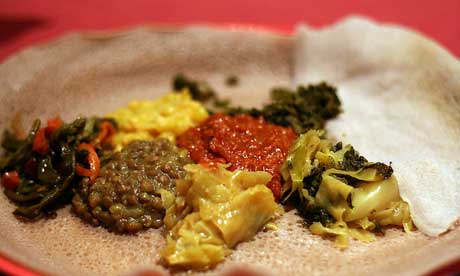
The combination of fermented flat-breads, meat and vegetables is a communal culinary delight, unlike any other
There’s only one way to enjoy injera,” Selam said as her long, coffee-coloured fingers tore off a strip of the flat, spongy-looking bread that lay on the brightly coloured mesob (basket table) before us.
Injera is eaten everywhere in Ethiopia, and in a style unique to the country.
Moments earlier our waitress had spooned steaming piles of food onto the round disc of injera. They included tibs (strips of fried beef), doro (chicken stew) and piles of carrots and spinach cooked with garlic.
“These little dishes are called wats,” Selam explained. The heady tang of berbere pepper caught at the back of my throat as Selam’s slender arm hovered over the wats, and then every so often her nimble fingers would pounce on a choice morsel and gobble it up with the injera clasped in the tips of her elegant fingers, like a heron snatching at small fish in the shallows.
Then she turned to me and said, “Open up.” I gingerly opened my mouth and quick as a flash she popped the little food parcel inside. “We call this gursha,” she said, “when you feed someone like an honoured guest or loved one.”
Injera is made from teff, a wheat-like grain grown in the highlands of Ethiopia. It’s pounded into flour, mixed with water and yeast, then left to ferment for a few days – this gives injera its distinctive, almost bitter taste. In the countryside, the women cook the pancake-like bread on large, round, clay cooking plates called mogogos, in much the same way as a crêpe.
And everyone eats together, sitting in a circle tearing off strips and helping themselves to the wats in the middle. It’s the most sociable way to eat in the world, and it’s the injera that makes it possible. Injera isn’t just food, it’s knife and fork as well.
“Do you like it?” Selam asked, her huge almond-shaped eyes flashing in the candlelight.
“Very much,” I told her as the flavours exploded like a firework in my mouth. Selam was pleased, and soon her fingers were putting together another little gursha parcel.